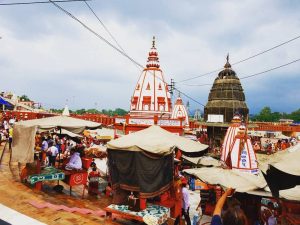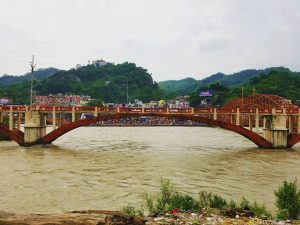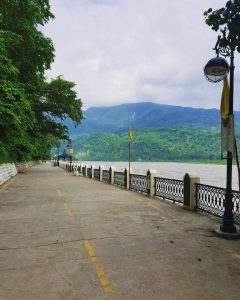
Temple Shikharas on the banks of the River Ganga. Haridwar, Uttarakhand, India

Bridge over the River Ganga to the Bathing Ghats. Haridwar, Uttarakhand, India.

Pedestrian and Bike Pathway next to the River Ganga. Rishikesh, Uttarakhand, India
FLORIDA, USA, September 26, 2017 (editorial by Hari Venkatachalam, Auburn Seminary): Hindus have been called upon since time immemorial to live harmoniously with the terrifying forces of Mother Nature, but over the years this message has been lost in layers of religious ritualism and modern consumerism. Garbage is regularly dropped absent-mindedly by pilgrims on their way to their prayers. If one stops to ask a person why they act with such disregard for the environment, they just shrug with impotence, “What can one person do? Everyone does it.” But Hindus can do something.
Hindus represent the largest sub-national religious group in the world with over 1 billion adherents in India, far surpassing the quarter-billion Christian Americans or Muslim Indonesians. They are a powerful social and economic force here in the United States, and we don’t need to scratch that far below the surface of our traditions to uncover the throbbing green veins of environmentalism. The whispering call to honor nature is behind many of our rituals. Nature for us is a visible and concrete symbol of a divinity that hides in the unknowable, dark place of pure consciousness. Not only in stone, but in all the elements of nature, the divine stands to protect and provide. It is truly a venerable message; But that voice is being stifled in the waves of polluted water, buried in the heaps of trashed earth, smothered in the billowing poisoned air, and burned in the warming temperatures of our planet. We no longer approach nature with God-fearing humility or devotion. It is arrogance, greed, and disdain that color our practices that corrupt nature.
So we Hindus now stand at the crossroads with a decision to make. We can continue along the path of destruction and face even worse disasters due to human impact to our environment. Or we can realize our collective political and social power, tap into the environmentalist stream that ebbs and flows through our ancient culture, and invest it in policies and concrete actions that reverse our environmentally damaging actions. We have to make a decision on how we Hindus want to interact with our planet.
For more, go to source
Hari Venkatachalam is a Master of Public Health candidate at the University of South Florida and a Hindu activist focused on social justice, environmental change, and LGBT rights issues based in the Tampa, Florida metropolitan area. Hari is a member of Sadhana: Coalition or Progressive Hindus.
Source: http://auburnseminary.org/one-hindus-environmental-pilgrimage-triveni-ghat-tampa-future/





